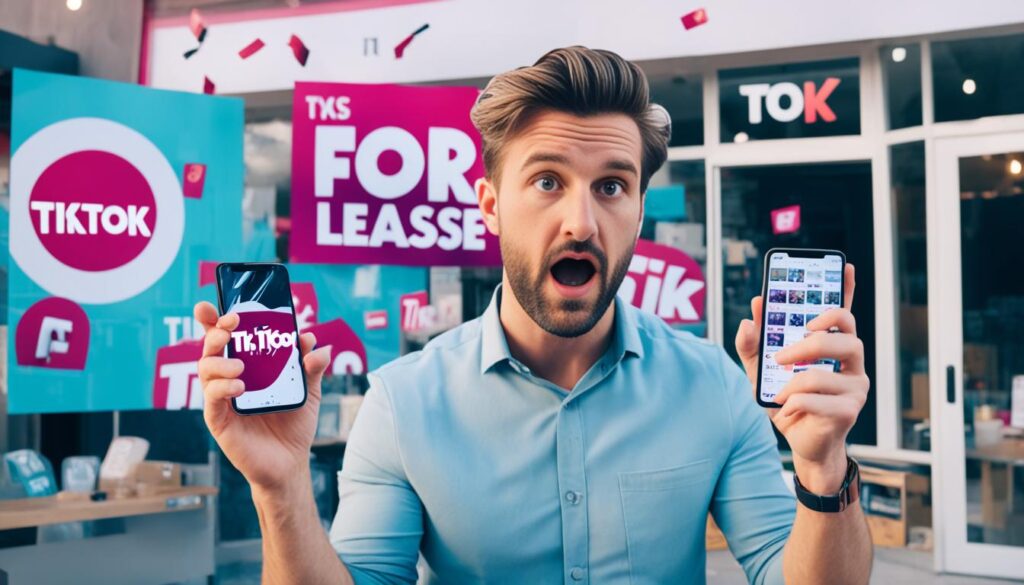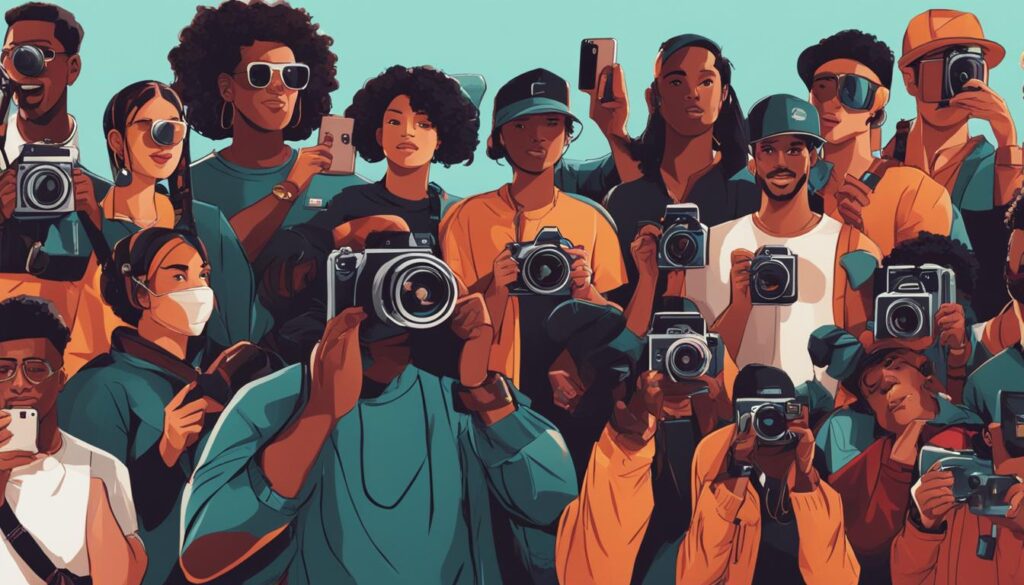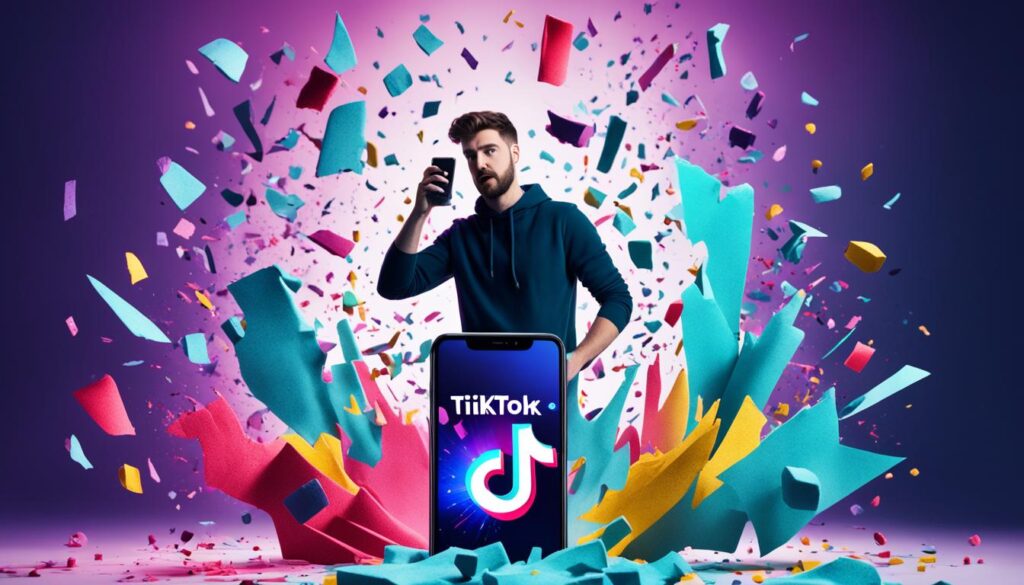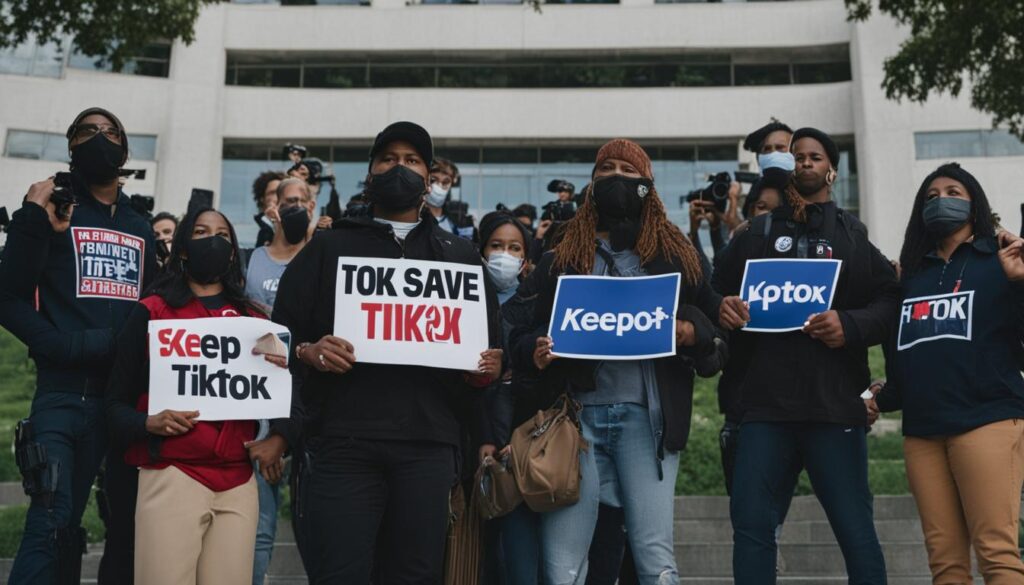The House of Representatives has passed a bill that could force TikTok to sell its app to an American-based company or face a ban in the U.S. This potential ban has sparked concerns among advertisers and creators who rely on the platform for their livelihoods and see it as a threat to free speech and expression. The bill aims to address national security concerns regarding TikTok’s Chinese ownership, but it could have far-reaching consequences for the digital marketing industry.
Key Takeaways:
- The potential TikTok ban poses a significant threat to both advertisers and creators.
- The ban could restrict freedom of speech and expression on the platform.
- It is essential for advertisers and creators to consider diversifying their presence on other platforms.
- Small businesses that rely on TikTok for growth and customer reach could be negatively affected.
- The final decision on the TikTok ban rests with the Senate and will shape the future of the digital landscape.
Concerns of TikTok Creators
Many TikTok creators have expressed their concerns about the potential ban and its impact on their livelihoods and freedom of speech. They argue that being an influencer on TikTok is a significant source of income, and the platform is more than just dancing videos. Creators fear that a ban would take away millions of jobs and limit their ability to reach and engage with their audiences.
Being a TikTok creator has become a viable career option for many individuals, allowing them to showcase their talents, creativity, and unique perspectives. The platform provides opportunities for creators to build a dedicated following and monetize their content through brand partnerships, sponsored promotions, and collaborations.
“TikTok has completely changed my life. It allows me to express myself creatively and connect with people who appreciate my content. Losing TikTok would mean losing a significant source of income and the ability to pursue my passion,” says Sarah Johnson, a popular TikTok creator with over 1 million followers.
The potential ban not only threatens the livelihoods of individual creators but also impacts the broader TikTok community. The platform has cultivated a creative ecosystem where creators inspire and collaborate with each other, pushing the boundaries of content creation. A ban would disrupt this vibrant community and force creators to seek alternative platforms, leaving behind the connections they have established on TikTok.
“TikTok ban would not only take away the livelihoods of creators but also limit the diversity of content available for users. It’s not just about dancing videos; TikTok provides a platform for creators to share their stories, experiences, and raise awareness on important issues,” emphasizes Jessica Martinez, a TikTok creator known for her educational and social justice content.
In addition to the impact on livelihoods, creators are concerned about the potential infringement on freedom of speech. TikTok has provided a space for creators to freely express their opinions, share their perspectives, and engage in meaningful discussions. Creators fear that a ban could set a precedent that restricts their ability to exercise their freedom of speech on other platforms as well.
The Evolving Relationship Between Creators and Their Audiences
TikTok creators have built strong connections with their audiences, often acting as influential figures and sources of inspiration. Through their content, creators have the power to entertain, educate, and stimulate conversations, resonating with millions of individuals across different age groups and backgrounds.
A potential TikTok ban would sever these connections, making it challenging for creators to maintain a direct line of communication with their followers. Without the platform’s algorithm and discoverability features, creators may struggle to rebuild their audience base on alternative platforms.
Impact on Digital Creativity and Innovation
TikTok has been a breeding ground for digital creativity and innovation, with creators constantly pushing boundaries and experimenting with new formats, trends, and storytelling techniques. This culture of innovation has allowed TikTok to stay at the forefront of digital content creation and captivate audiences worldwide.
A ban would not only disrupt the creative flow for individual creators but also stifle the overall growth of the digital content landscape. The loss of TikTok as a platform for experimentation and creativity could have long-lasting implications for the digital marketing industry as well.
| Concerns of TikTok Creators | Impact |
|---|---|
| Livelihoods | Loss of income, limited career opportunities, disrupted creative ecosystem |
| Freedom of Speech | Potential restrictions on expressing opinions and engaging in discussions |
| Connection with Audience | Challenges in maintaining direct communication and rebuilding audience base |
| Digital Creativity and Innovation | Stifled growth in content creation and limitation of experimentation |
Impact on Small Businesses and Advertising
The potential ban of TikTok would have far-reaching consequences, not only for creators but also for small businesses and the advertising industry. TikTok has played a significant role in driving economic growth and job creation in the U.S., with many small businesses leveraging the platform to reach their customers and build brand awareness.
Small businesses have found success through TikTok’s unique content format and the ability to engage with a large and diverse audience. By showcasing their products and services in creative and entertaining ways, these businesses have been able to capture the attention of potential customers and drive sales.
Furthermore, TikTok’s algorithm allows small businesses to reach a wider audience, gaining exposure that would be challenging and costly to achieve through traditional advertising channels. The platform’s extensive user base provides an opportunity for businesses to connect with potential customers who may not have been reached otherwise.

A potential ban on TikTok would disrupt these business strategies and hinder the growth of small businesses, particularly those that heavily rely on the platform for their marketing efforts. The loss of TikTok as a promotional tool could lead to a decline in revenue, making it difficult for small businesses to sustain their operations and retain employees.
The Ripple Effect
The impact of the TikTok ban extends beyond individual businesses. It would also have implications for the advertising industry as a whole. Advertisers have recognized the potential of TikTok as a valuable channel to engage with their target audience. Through TikTok’s innovative ad formats and the ability to collaborate with creators, advertisers have been able to create impactful campaigns that resonate with users.
The ban would force advertisers to pivot their advertising strategies, reallocating resources and adapting to new platforms. This transition could result in increased competition and saturation in alternative channels, potentially driving up advertising costs.
“TikTok has been a game-changer for small businesses, providing an efficient and cost-effective way to reach a wide audience. If the ban comes into effect, we would have to rethink our marketing approach entirely and allocate more resources to other channels. It’s a significant setback for our business.”
– Jane Smith, Marketing Manager at a small e-commerce company
Diversifying Advertising Strategies
In light of the ban threat, businesses and advertisers are urged to diversify their advertising strategies to hedge against the potential loss of TikTok. Exploring other social media platforms such as YouTube Shorts, Meta, Instagram, and Snapchat can help businesses maintain their digital presence and continue reaching their target audience.
By diversifying their advertising efforts across multiple platforms, businesses can leverage the strengths of each platform to connect with different segments of their target market. This multi-platform approach reduces the risk of relying too heavily on a single platform and ensures greater resilience against unforeseen disruptions.
Ultimately, the impact of the TikTok ban on small businesses and the advertising industry hinges on the final decision made by lawmakers. The consequences are far-reaching, affecting the livelihoods of many, hindering economic growth, and requiring businesses to adapt their marketing strategies. It’s a pivotal moment for the digital landscape, with much at stake.
Call to Diversify and Invest in Other Platforms
As the threat of a TikTok ban looms, industry experts are urging creators to diversify their content and establish a presence on other platforms. By expanding their multiplatform presence, creators can protect themselves from the potential impact of the ban and continue to engage with their followers. Investing in alternative platforms provides a valuable opportunity to reach new audiences and maintain a stable income.
Diversifying content across various platforms allows creators to tap into different user bases and explore alternative formats and audiences. While TikTok has been a dominant force in the short-form video space, other platforms like YouTube Shorts, Meta, Instagram, and Snapchat offer equally lucrative opportunities.
“It’s essential for creators to diversify their content and not rely solely on one platform,” says industry expert Sarah Johnson. “Having a diversified presence safeguards against potential disruptions and ensures continuous engagement with your audience.”
The TikTok ban threat serves as a wake-up call for creators, highlighting the importance of exploring other avenues for creating awareness and engaging with audiences. By investing time and effort into building a multiplatform presence, creators can safeguard their livelihoods and mitigate the risks associated with platform-specific bans.
Not only does diversifying enable creators to hedge against potential disruptions, but it also opens up opportunities to collaborate with brands and secure sponsorships beyond TikTok. Brands are constantly looking for creators who can deliver content across multiple platforms, maximizing their reach and impact. By embracing a multiplatform strategy, creators can position themselves as highly sought-after influencers with a broader audience reach.
“Investing time and resources into platforms like YouTube Shorts, Meta, Instagram, and Snapchat is a smart move for creators looking to future-proof their careers,” advises marketing consultant David Anderson. “The evolving digital landscape demands creators to adapt and expand their reach, ensuring continuous success in an ever-changing industry.”
Now, let’s take a closer look at some of the alternative platforms creators should consider.
YouTube Shorts
YouTube Shorts, a platform dedicated to short-form videos, offers creators a chance to tap into a massive user base and capitalize on YouTube’s robust monetization options. With the backing of Google, YouTube Shorts provides a favorable environment for creators to diversify their content and expand their reach.
Meta
Formerly known as Facebook, Meta’s family of apps, including Facebook, Instagram, and WhatsApp, presents a vast ecosystem for creators to connect with diverse audiences. Creators can leverage Meta’s extensive advertising capabilities and user engagement to grow their following and monetize their content.
Instagram, one of the most popular social media platforms, offers a variety of features and formats for creators to engage their followers. From short videos through Reels to long-form content through IGTV, Instagram provides a versatile space for creators to showcase their talent and diversify their content offerings.
Snapchat
Snapchat, known for its ephemeral nature, allows creators to share quick and engaging content with their audience. With features like Snap Map and Discover, creators can reach a highly engaged user base and explore innovative ways to captivate their viewers.
By diversifying their content and investing in platforms like YouTube Shorts, Meta, Instagram, and Snapchat, TikTok creators can protect their income streams, expand their audience reach, and future-proof their careers. The ban threat may be daunting, but it also presents an opportunity for creators to evolve and thrive in an ever-changing digital landscape.

Concerns About Censorship and First-Hand Perspectives
As the possibility of a TikTok ban looms, many TikTokers are expressing concerns about the potential consequences. One major concern is the potential for increased censorship and the loss of first-hand perspectives on important issues. TikTok has become a valuable platform for diverse news and local perspectives, allowing people to learn about the world from those directly affected.
“TikTok has given a voice to so many underrepresented communities. It allows us to share our stories and educate others about our experiences. If a ban happens, we will lose that platform for diverse voices and alternative news sources.” – @influencer1
TikTok has provided an opportunity for individuals to share their stories and highlight important issues that are often overlooked by mainstream media. By interacting with content creators from different backgrounds and perspectives, users can gain a better understanding of the world around them and foster empathy.
Additionally, TikTok’s algorithm-driven content recommendation system has allowed users to discover diverse viewpoints and news sources they may not have otherwise encountered. This exposure to various perspectives has been crucial in promoting a more well-rounded understanding of global events and social issues.
The potential ban on TikTok could limit access to these diverse perspectives and alternative news sources, creating a gap in the availability of reliable and varied information. It could also hinder the ability of users to engage in important conversations and stay informed about current events.
To illustrate the impact of first-hand perspectives on TikTok, here is a collection of videos that shed light on various social and political issues:
- Video 1: A protester sharing their experience at a rally advocating for climate change action.
- Video 2: A medical worker providing insights into the realities of working on the frontlines of the COVID-19 pandemic.
- Video 3: A local journalist reporting on an ongoing social justice movement in their community.

The loss of TikTok would mean losing access to these raw and unfiltered perspectives, leaving users with a limited range of news sources that may not capture the diversity and complexities of our society.
Next, we will explore the public opposition and advocacy that has emerged in response to the TikTok ban threat, as users and creators band together to voice their concerns and fight for the preservation of the platform.
Public Opposition and Advocacy
In response to the TikTok ban threat, there has been widespread public opposition and advocacy from creators and users alike. Concerns about the potential ban have sparked a movement, with individuals using the #KeepTikTok hashtag to rally against the decision. Creators and small business owners have taken to social media to express their concerns about the profound impact the ban could have on their audiences and livelihoods.
Through videos, posts, and live streams, TikTok users are making their voices heard, emphasizing the positive impact TikTok has had on their lives and communities. They fear that a ban would not only limit their ability to create and share content but also hinder the platform’s potential for social and cultural exchange.
Many creators have urged their followers to get involved by contacting their lawmakers and expressing their opposition to the bill. By mobilizing their fanbase, they aim to raise awareness about the impact that banning TikTok would have on millions of Americans who rely on the platform as a source of entertainment and inspiration. By calling lawmakers, users seek to advocate for the preservation of TikTok and raise concerns about the potential consequences of the ban on the American people.
“TikTok is not just entertainment; it’s a community, a platform that connects people from all walks of life. It’s a place where we share stories, find support, and express ourselves freely. Banning TikTok would be a huge blow to our right to free speech and expression,” said Sarah, a prominent TikToker and user advocate.
TikTok’s impact goes beyond individual creators. The platform has become an integral part of fostering entrepreneurship and small business growth. Millions of small businesses rely on TikTok’s unique algorithm to reach their target audience successfully. Banning TikTok would deprive these businesses of a valuable customer acquisition tool and potentially have a detrimental effect on economic growth.
The opposition and advocacy movement against the TikTok ban highlights the significant number of Americans who use the platform and the millions of small businesses that depend on it. Advocates argue for the preservation of TikTok, championing its positive influence on American society and calling for a balanced approach to address national security concerns.
| Impact on American People | Reasons for Advocacy |
|---|---|
| Loss of a popular form of entertainment and self-expression | Preservation of freedom of speech and creativity |
| Impact on small businesses and economic growth | Maintaining opportunities for entrepreneurship and job creation |
| Restriction of diverse voices and perspectives | Supporting the accessibility of alternative news sources and cultural exchange |

Conclusion
The potential TikTok ban has raised significant concerns among advertisers and creators, who fear the profound impact it could have on their ability to reach and engage with their audiences. For creators, TikTok serves as a vital source of income, making the ban a direct threat to their livelihoods. Similarly, businesses that have found success on the platform now face challenges in continuing their digital marketing efforts.
While the proposed bill aims to address national security concerns, the consequences for the digital marketing industry and freedom of speech are at stake. TikTok has become a powerful tool for businesses to connect with their target audience, and the ban would disrupt this successful avenue. Advertisers would lose access to a platform that has provided immense reach and engagement, forcing them to explore alternative strategies.
The final decision on the TikTok ban rests with the Senate, and it will determine the future of TikTok and the digital landscape. If the ban goes into effect, it will have a ripple effect on digital marketing and the livelihoods of creators and advertisers alike. The implications extend beyond economic impact, as it could also jeopardize freedom of speech and expression. The digital marketing industry must now brace for potential changes and adapt to a new landscape without TikTok.
FAQ
How is the threat of a TikTok ban impacting advertisers and creators?
The potential TikTok ban has raised concerns among advertisers and creators, as it could have a profound impact on their ability to reach and engage with audiences. Advertisers may lose access to a large and highly engaged user base, while creators could potentially lose their primary source of income.
What are the concerns of TikTok creators regarding the ban?
TikTok creators are concerned about the potential ban’s impact on their livelihoods and freedom of speech. Being an influencer on TikTok is not just about dancing videos; it is a significant source of income for many creators. They fear that a ban would take away millions of jobs and limit their ability to reach and engage with their audiences.
How will the ban impact small businesses and the advertising industry?
The ban could have repercussions for small businesses and the advertising industry. Many small businesses rely on TikTok to reach their customers and drive economic growth. A ban on TikTok could harm the U.S. economy and hinder the growth of businesses that have found success through the platform’s content and audience reach.
What is the advice for TikTok creators in response to the ban threat?
Industry experts advise TikTok creators to diversify their content and establish a presence on other platforms such as YouTube Shorts, Meta, Instagram, and Snapchat. This way, they can mitigate the potential impact of the TikTok ban and continue to reach and engage with their followers.
What are the concerns about censorship and first-hand perspectives in relation to the ban?
Some TikTokers worry that the ban could lead to censorship and the loss of first-hand perspectives on important issues. TikTok has been a valuable source of diverse news and local perspectives, allowing people to learn about the world from those directly affected. The ban could restrict access to these perspectives and limit the availability of alternative news sources for users.
How are creators and users responding to the ban threat?
In response to the TikTok ban threat, there has been public opposition and advocacy from creators and users. The #KeepTikTok hashtag has been used to rally against the potential ban, with creators and small business owners sharing their concerns about the impact on their audiences and livelihoods. Some creators have encouraged their followers to contact lawmakers and express their opposition to the bill.
What is the impact of the TikTok ban on digital marketing and the parties involved?
The potential TikTok ban would have significant consequences for the digital marketing industry, impacting both creators and advertisers. It threatens the livelihoods of many creators and poses challenges for businesses that have found success on the platform. The final decision on the ban rests with the Senate, and its outcome will shape the future of TikTok and the digital landscape.








